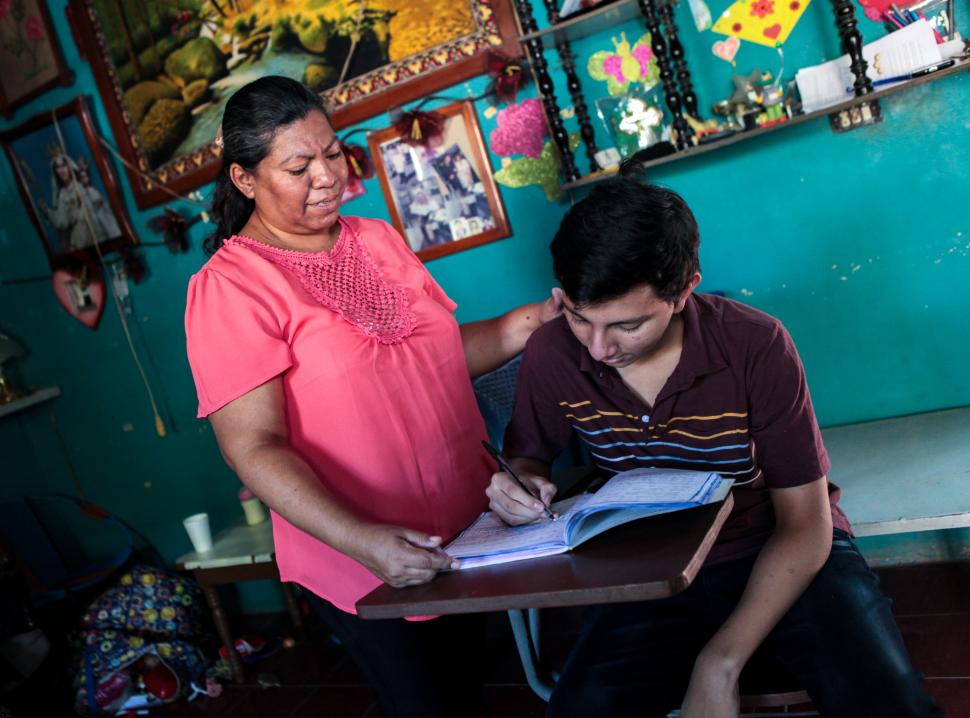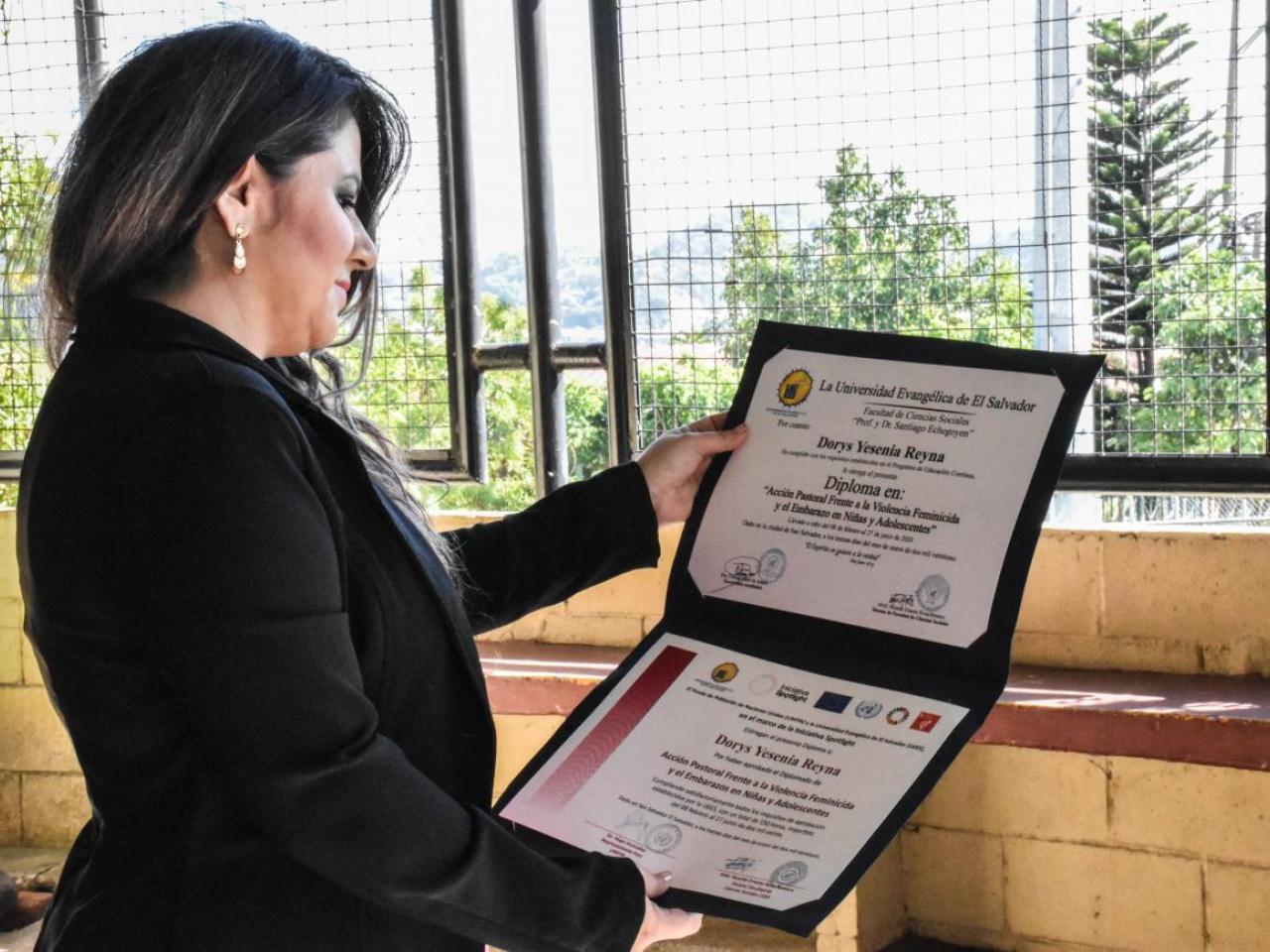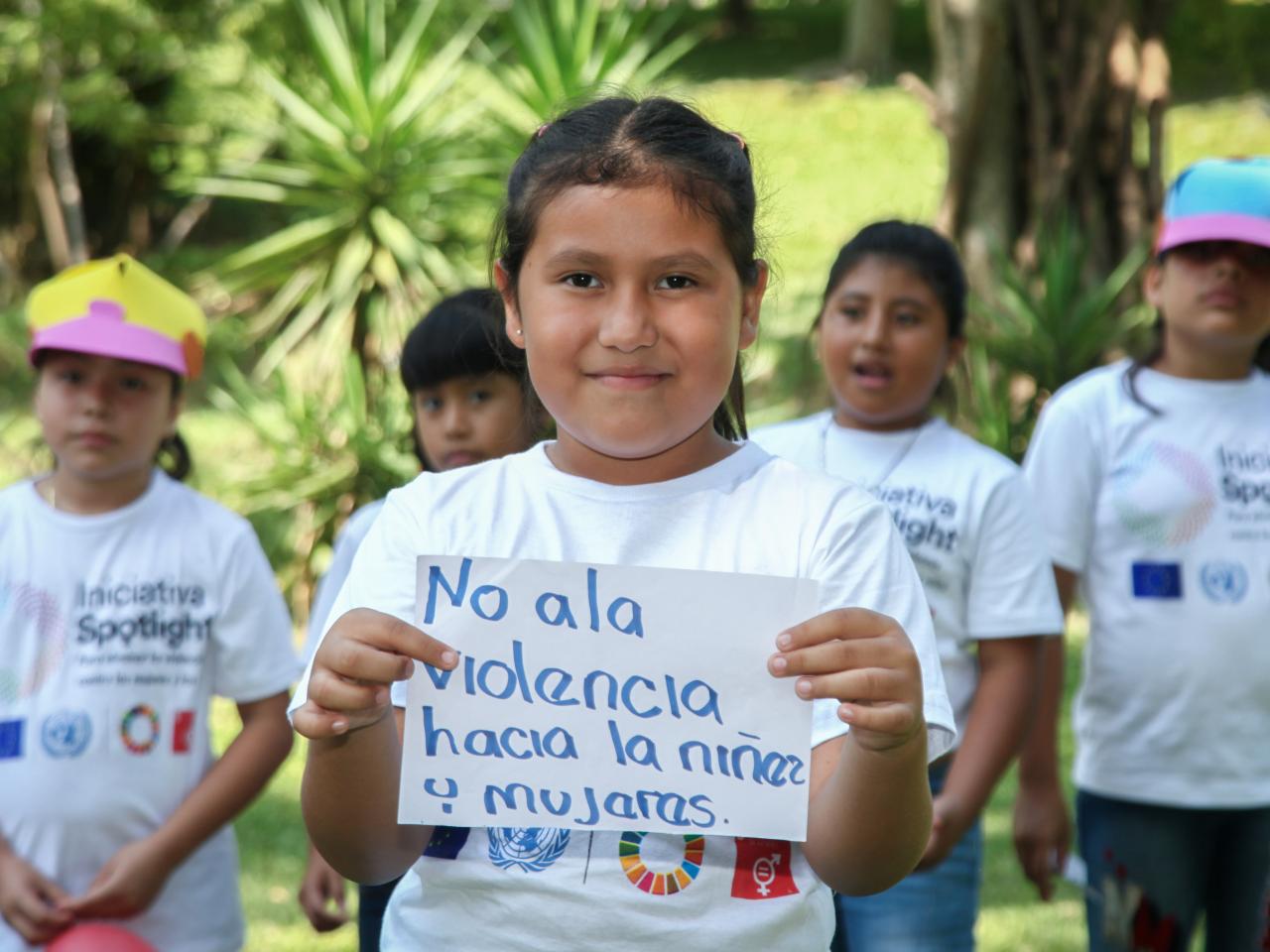Change begins at home: respectful parenting practices bring peace at home in El Salvador

In El Salvador, Spotlight Initiative supported UNICEF to train more than 500 parents and community leaders on positive parenting practices to help prevent violence against women and girls. Many have since gone on to spread these practices amongst others in their communities in this peer-to-peer approach to changing harmful social and gender norms.
Nancy Orellana, a mother and academic tutor, is one of 500 parents who were invited to train with the I Am A Person programme, aimed at educating parents on effective, compassionate and respectful communication with their adolescents. The programme, led by UNICEF and funded by the Spotlight Initiative, takes the life-course approach to preventing violence because of the deep intersections between violence against children and violence against women. Both are fuelled by social and gender norms that consider physical violence as an acceptable form of ‘disciplining’ women or children. Children who experience violence or witness violence against their mother while growing up are more likely to one day perpetrate or suffer from violence in their future relationships. Children internalize harmful norms, values and practices from an early age, which makes early intervention through initiatives like this so critical.
“I think adolescents would like to find more understanding, better communication and trust in their families,” says Ms. Orellana. “This training has helped me a lot. I have learned to control my anger before I sit down and speak to my son. We recognize that we all have stress in our lives that can affect our relationships.”
“This training has helped me a lot. I have learned to control my anger before I sit down and speak to my son. We recognize that we all have stress in our lives that can affect our relationships.” - Nancy Orellana, mother and academic tutor
Ms. Orellana now uses her I Am A Person training to mentor 10 other families that are experiencing intergenerational tension in the home, which is exactly the kind of multiplier effect this initiative had hoped to encourage. The children and adolescents in these families have been classed as “rebellious” by social services and school authorities, and there is a breakdown in parent-child communication.
Ms. Orellana’s 14-year-old son, Fredi, is already benefitting. He now sees his relationship with his mother and grandmother as a reference point when relating to girls his age in a healthy and equitable way.
“Cultural practices around parenting are relatively violent in El Salvador,” says Sandra Aguilar, UNICEF El Salvador Child Protection Officer. “There is trouble with guns and gangs, but we cannot protect the affected children and adolescents without involving the family. Parents don’t always cooperate due to the cultural norms around parenting in the home.”
UNICEF El Salvador Education Officer Marta Navarro explains that I Am A Person has also presented an opportunity to promote a change in attitudes towards gendered roles and traditions that persist in communities, particularly around parenting and childcare.
El Salvador has one of the world’s highest rates of violence in the world, with children and adolescents frequently living in insecurity.
The I Am A Person methodology at the heart of this initiative was first institutionalized a decade ago in El Salvador. Developed by the Salvadoran Institute for the Integral Development of Childhood and Adolescence (ISNA), it was aimed at the time at improving parental approaches to the early childhood years. As part of the Spotlight Initiative, UNICEF partnered with ISNA to adapt the concept for families with adolescents aged 10–19 years.
The approach was informed by a study of successful parenting programmes which increased communication between adolescents and parents (the most important factor underlying improvements in other adolescent well-being outcomes, such as reduced experience of violence and improved mental health indicators); increased parental monitoring; reduced neglect of adolescents; and reduced physical and emotional violence against adolescents.
“There needs to be a support network in the community that encourages positive parenting and boosts the self-esteem of caregivers – mainly women – who typically assume this role,” says Ms. Navarro.
A primary group of 500 parents like Ms. Orellana, and their families, received training to enhance intergenerational communication at home and to counter harmful practices against children and adolescents, particularly through a violence against women lens. Many volunteered enthusiastically for this training after having experienced the benefits of the first I Am A Person programme 10 years ago.
“There needs to be a support network in the community that encourages positive parenting and boosts the self-esteem of caregivers." - Marta Navarro, UNICEF El Salvador Education Officer
The volunteer families were chosen based on their family structure (such as multigenerational families with adolescents), their deep-rooted ties within their local communities, their capacity to train others and a track record of community leadership.
In El Salvador, families are more receptive to changing social and gender norms when they learn from peers who can share relatable, personal experiences and those who understand the context of their local community. With the primary group of 500 families trained, the next target is for these families to train many others. The COVID-19 pandemic and resulting lockdown periods have made in-person training challenging, but the programme has successfully pivoted to training parents virtually.
To further amplify the message of positive parenting, 1,000 resource packages were distributed to the families of health-care workers who have been under stress during the pandemic. The packages provide resources on how to improve effective, respectful communication within the home.
“Community service organizations can only reach a certain number of people. We hope that by training and empowering these 500 families, we will achieve a multiplier effect because of the number of others this core group can reach,” says Ms. Aguilar.



